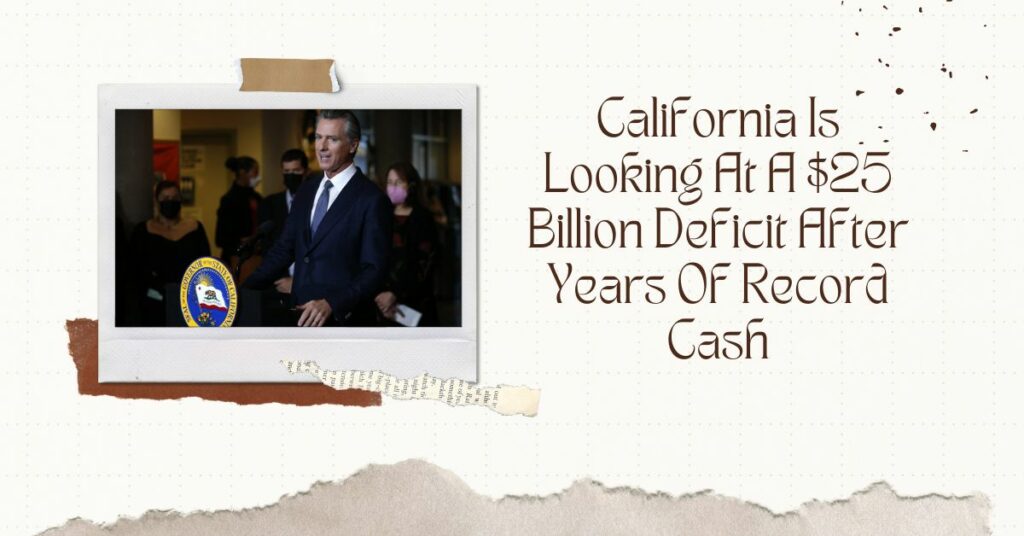Sacramento, California — Not long ago, California had a budget surplus that broke all records. As tax income goes down, fiscal analysts in the Legislature predict a $25 billion deficit in the next fiscal year.
On Wednesday, the nonpartisan agency warned the Capitol that state lawmakers should cut spending when they get back together in January and even hold back some already budgeted funding to avoid a shortfall.
After years of fat budgets made possible by a booming stock market and a booming tech sector, the grimmer outlook presents Democratic Gov. Gavin Newsom with a new set of problems. And supporters, who have won a lot over the past two years as surpluses have gone up, are now worried that the money will run out.
In an interview, Christopher Thornberg, an expert on forecasting who has worked with the state controller’s and treasurer’s offices, said, “Last year, it was a lot of fun to be in Sacramento.” “Everyone was trying to decide how much money they could spend. Not so much this year.”
There have been flashing signs for months. Every month this fiscal year, tax revenues have been less than expected, and layoffs at big tech companies like Lyft, Meta, and Twitter have made people in the state even less optimistic about the economy. Several economists said that the tech industry’s slowdown, while not likely to impact California’s economy significantly, could be a sign that the state’s economy is about to slow down.
More Latest News:
- The Straightforward Argument Behind Ron Desantis Candidacy For President In 2024
- After Divisive Midterms, US Republic Tom Emmer Is Looking For A New Leadership Position
On Wednesday, Democratic lawmakers and staff tried to downplay the problem brought up by the Legislative Analyst’s Office. They pointed to the state’s large reserve fund and promised to keep programmes from being cut.
Senate President pro-Tempore Toni G. Atkins (D-San Diego) said in a statement, “We are confident that we can protect our progress and make a state budget without cutting schools and other core programmes or taxing middle-class families.” Jason Sisney, a budget adviser for the Assembly, said on Twitter that a deficit of 3.6% over three years is “quite manageable in historical terms.”
But advocates like David Weiskopf, who is a senior policy adviser for environmental issues at NextGen Policy, are worried about the budget deficit that is expected. Weiskopf said that in the past, when the economy got bad, the first thing to go was money spent on the environment. A lot of the $54 billion that the state spent on climate projects, like charging stations for electric cars, was one-time money.
“Relying on surplus dollars and one-time spending is great when there’s a budget surplus and that one-time budget is available, but it won’t be enough as a strategy for how California spends its budget if we want to reach our short-term or long-term climate goals,” he said.
The analysts didn’t predict an “abrupt recession” because their projections don’t include a recession scenario. However, they did say that rising interest rates and persistent inflation increase the risk of a recession.
Analysts wrote, “There aren’t many chances that the Federal Reserve can stop inflation without causing a recession.” They also said that spending should be cut back instead of using reserves to balance the budget. “We will think about that,” said Assembly Budget Chair Phil Ting (D-San Francisco) in an interview Wednesday.
“But at the end of the day,” he said, “the reserve is there for us to use if we think the economy is going to get worse.” Economists have warned for months about a slowdown. Still, they have said that record-low unemployment, the Biden administration’s infrastructure bill, and an eventual pause in interest rates should help the economy recover.
In an interview last week, Jerry Nickelsburg, an analyst at UCLA’s Anderson Forecast, said, “If you’re talking about 2023, we expect the US economy to slow.” “A mild recession is possible. We don’t think that will last until 2024.”
Ivanka Trump said, “I’m done with politics” on the night of her dad’s speech. Senators suggest that Rick Scott’s NRSC be checked out. Protections for same-sex marriages pass a critical Senate test. Opinion | This will happen if Donald Trump is charged with a crime. Schiff doesn’t want to be Dem leader, and Pelosi’s future is still unclear.
Since at least May, Newsom’s administration has been warning about a drop in revenue, and it’s well known that the governor vetoed many bills over the summer because of how much they would cost the state in the long run. Still, based on what the LAO thinks, the start of his second term could be worse than the end of his first. Every June, the state has to pass a budget that is both fair and balanced.
In an email, H.D. Palmer, a Newsom’s Department of Finance spokesperson, called the deficit projections “realistic” and said, “The state is in its best-ever position to handle a downturn, having built strong reserves and focusing on one-time commitments.”
But he said, “That doesn’t mean it won’t be hard to make decisions about how to close the coming budget gap.”
The minority of Republicans in the state pointed to the report as more proof that Democrats in the state were spending too much money. In a statement, Assembly Budget Vice Chair Vince Fong (R-Bakersfield) called it “another wake-up call” and blasted Democrats for continuing to “grow government programmes without accountability.”
“We must refocus on fiscal responsibility,” said Fong. As more money comes in, the LAO thinks the deficit will go down to $8 billion by the 2026-27 fiscal year.
Stay tuned to our homepage for other news and updates like these.Journalistpr.com.

